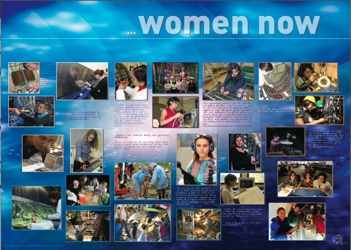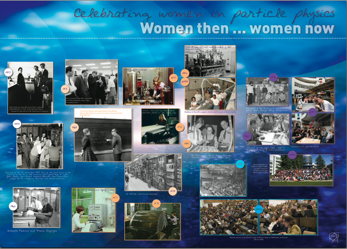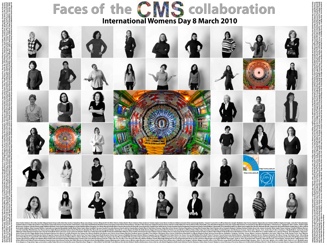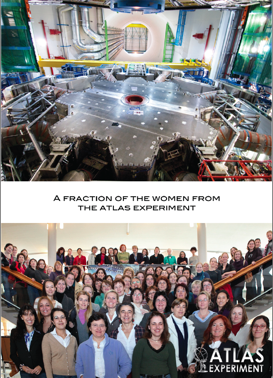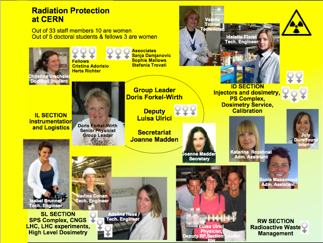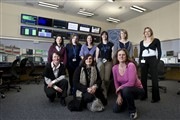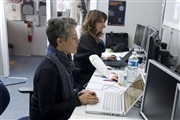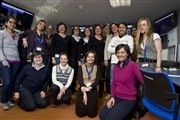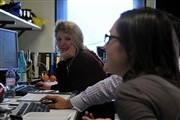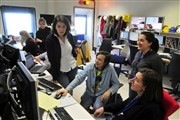Text



CERN, the European Organization for Nuclear Research, is one of the world’s largest and most respected centers for scientific research. Its business is fundamental physics, finding out what the Universe is made of and how it works. At CERN, the world’s largest and most complex scientific instruments are used to study the basic constituents of matter — the fundamental particles. By studying what happens when these particles collide, physicists learn about the laws of Nature.
The instruments used at CERN are particle accelerators and detectors. Accelerators boost beams of particles to high energies before they are made to collide with each other or with stationary targets. Detectors observe and record the results of these collisions.
Founded in 1954, the CERN Laboratory sits astride the Franco–Swiss border near Geneva. It was one of Europe’s first joint ventures and now has 20 Member States.
On March 8th, 2010, during International Women's Day, CERN will celebrate the progress of women in particle physics. CERN is encouraging its staff and users to enable as many women as possible to be on shift in the control rooms for CERN's experiments and accelerators, staff the IT helpdesk, and guide official visits. By this action, CERN hopes to make even more visible the presence of women at all levels throughout the laboratory, and to send a clear message to all young women interested in particle physics and high technology that they are welcome in the field as physicists, engineers and computer scientists. The goal is to show the world that particle physics is a field where women play an active role at the forefront of experimental research.





Poster exhibition at CERN
These posters will be on display in the lobby of each restaurant at CERN, and the INFN photo exhibit will be shown outside the Council Chamber.




Geneva, 4 March 2010. On Monday 8 March, CERN will take on a distinctly feminine look as the laboratory celebrates the role of women in physics. Often seen as a male preserve, the reality is rather different, with women playing key roles across all areas of CERN activity.
“At CERN, and in particle physics the world over, talent is the only criterion that counts,” said CERN Director General Rolf Heuer. “Gender, race and religion have no part to play in finding the right person for the job.”
On women’s day, CERN will be sending a clear message to any young women interested in science and engineering that this is a field for them. In the CERN Control Centre, half the Engineers-in-Charge who take responsibility for operating the Large Hadron Collider, the world’s most powerful particle accelerator, are women. In the experiments, in all CERN departments and in the management, women are increasingly represented.
For women’s day, CERN is encouraging its staff and users to enable as many women as possible to be on shift in the control rooms of the laboratory’s experiments and accelerators, to staff the IT helpdesk and to guide official visits.
“The fact that we can do this easily may come as a surprise to those who don’t know us better,” said Heuer, “but it’s no surprise to me. Curiosity, the main prerequisite for being a researcher, is a shared characteristic of all humankind and that’s reflected in the CERN community. Men and women from all over the world come here to pursue their research, and the diversity they bring is one of our greatest assets.”
The US laboratory, Fermilab, is also celebrating women’s day in similar style, and at 15:30CET, there will be a videoconference link between the two labs.
***********************************************************************************************
Genève, le 4 mars 2010. Le lundi 8 mars, le CERN prendra une apparence résolument féminine alors que le Laboratoire rendra hommage au rôle que jouent les femmes dans le monde de la physique. Contrairement aux idées reçues, la discipline n’est plus l’apanage des hommes, les femmes jouant au CERN des rôles essentiels dans tous ses domaines d'activité.
« Dans le domaine de la physique des particules, au CERN comme ailleurs, le talent est le seul critère qui compte, a déclaré Rolf Heuer, Directeur général du CERN. Le sexe, la race ou la religion n’entrent pas en ligne de compte lorsqu’il s’agit de trouver le bon candidat. »
À l’occasion de la Journée de la femme, nous souhaitons envoyer un message clair aux jeunes femmes attirées par la science et l’ingénierie pour leur dire que ces disciplines sont aussi faites pour elles. Au Centre de contrôle du CERN, la moitié des ingénieurs responsables de l'exploitation du Grand collisionneur de hadrons, l'accélérateur de particules le plus puissant du monde, sont des femmes. Au sein des expériences, des différents départements et de la Direction du CERN, les femmes sont de plus en plus représentées.
À l’occasion de cette journée, le CERN invite son personnel et ses utilisateurs à permettre au plus grand nombre de femmes possible d’être aux postes de contrôle des expériences et des accélérateurs du Laboratoire, d’être présentes au service d’assistance informatique et de guider des visites officielles.
« Le fait que nous puissions organiser cela si facilement pourra surprendre ceux qui ne nous connaissent pas bien, a souligné Rolf Heuer, mais pour moi, cela n’a rien d’étonnant. La curiosité, la condition préalable essentielle pour être chercheur, est une caractéristique commune aux hommes et aux femmes, et la communauté du CERN l’illustre bien. En effet, des hommes et des femmes du monde entier viennent ici conduire leurs recherches, et la diversité qu’ils apportent avec eux est l’une de nos plus grandes richesses. »
Le laboratoire américain Fermi célèbre aussi à sa façon la Journée de la femme, et, à 15 h 30 (HEC), les deux laboratoires seront en liaison par visioconférence.





ATLAS is proud of its record of diversity and equal opportunities at all levels, based on merit, not gender, nationality, or cultural background. Women have a range of key roles in ATLAS, such as experiment head (Spokesperson), Deputy Collaboration Board Chair, Project Leaders, System Run Coordinators and Leaders of physics analysis activities.
On the occasion of International Women's Day, ATLAS would like to reaffirm its commitment to continue this fully open tradition, for example regarding equal gender opportunities, with particular attention to the younger generation.


Women scientists, engineers and technicians have been and are taking significant roles in every aspect of building, commissioning and running of the CMS detector as well as in extracting scientific results from our data. Today 588 women scientists work in CMS.
This is a fundamental progress in the field of scientific research that is well known within the international scientific community. We would like to take the occasion of the International Women's Day to publicize it to the society at large and in particular to the young public.
This is why today, to highlight the wide range of key roles that women scientists play in CMS, all major functions that are needed to run our complex apparatus are covered by women scientists.

Please consider that the downloading of the posters may take time depending on their size
19.2 MB
23.7 MB
2.5 MB
6.3 MB
5.7 MB
23.5 MB
1.4 MB







